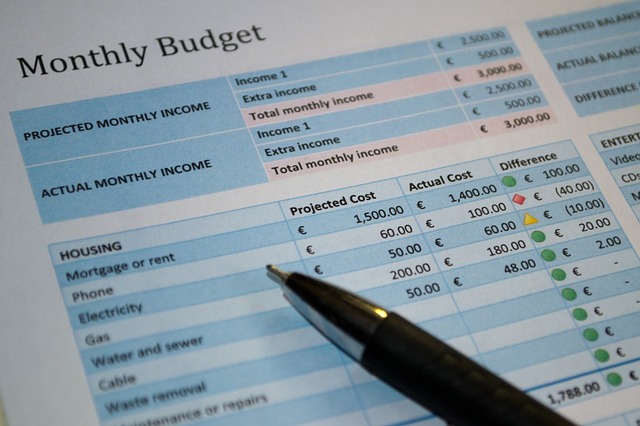
Got Budget? By Dr. Gary Hoag
 Do you live on a budget?
Do you live on a budget?
Most budgets include four (or five) basic categories, namely, money for giving, spending, saving, paying taxes, and (if necessary) debt repayment.
Statistics show that only about one-third of American households live on a budget (Gallup 2013). Not living on a budget can contribute to further challenges, such as making it hard to live on less than you make, which results in slavery to debt. I realize that some suffer financially due to the decisions of others or as victims of calamity. Sadly, however, the data shows that a growing number of people, consciously or unconsciously, are overspending.
Last year, the collective personal savings rate in America came in at 5%, when we consider the data for millennials though, it went into the negative, or -1.8% (20 Something Finance 2017). Advisors who adopt the world’s view on financial management warn that this adversely impacts net worth. In plain language, advisors who believe “having more money is better” are alarmed. Perhaps they should be. As people collectively overspend, they don’t have money for the advisors to manage, and they won’t be customers anytime soon due to high levels of debt.
I am writing today to report there’s a bigger concern at play for every steward to consider. It has eternal implications. It’s pretty hard to “give an account for your stewardship” if you are among the two-thirds of people who are not even keeping track of how you are spending God’s money (see Luke 16:2). And, I surmise that the reason giving statistics do not change much year over year might reveal a symptom of a deeper issue. Many stewards are slaves to money.
Everything everyone possesses belongs to God (see Psalm 24:1). And parables of Jesus such as “the minas” (see Luke 19:11-27) and “the talents” (see Matthew 25:14-30) reveal a consistent theme to stewards. Someday we will have to give an account for our stewardship of God’s money. This is not about getting a grade; it’s a pass / fail test.
At this point I am not saying that how you steward money becomes your ticket to heaven! What I am saying is that how you steward money reflects what you believe. Some argue that they can keep tons of money, as long as their heart is in the right place. Jesus said that where one stores up money shows where that person’s heart is (Matthew 6:19-21). Take this from someone who stored it in the wrong place for years.
Additionally, Jesus adds that no one can serve God and money and then shares the catastrophic implications of unfaithful stewardship in parables. So, what should every steward do? I suggest two things. First, live on a budget with four (or five) parts to prepare yourself to give an account for your stewardship to God.
(1) Give richly
That is, store up as much money as possible in heaven through giving to things God cares about rather than foolishly stockpiling it on earth, see Matthew 6:19-21; Luke 12:13-21; 1 Timothy 6:17-19).
(2) Spend simply
Pay cash for things you need (and enjoying special purchases on occasion). Live in as small a place, drive a used car, prepare most of your meals at home, etc (see Acts 28:30-31; 1 Timothy 6:6-8).
(3) Save carefully
Measure saving with a mina, that is, limit cash on hand to three months of income to have money for unexpected bills and to function (see Psalm 49; Luke 10:25-37).
(4) Pay taxes
Most people know that Jesus said to “render to Caesar what is Caesar’s.” Many however, forget to give “to God the things that are God’s” (see Mark 12:17). That’s everything, after paying taxes, of course.
(5) Retire debts
While having financial debt is not a sin, it enslaves those who have it. If you have financial debt, pay it off, so you are free to serve. Keep only the debt of love to others outstanding (see Proverbs 22:7; Romans 13:8)
Second, help loved ones prepare to give an account for their stewardship. Teach them to live on a budget that reflects service to God. Their hearts will follow.
Many will say, “Lord, Lord, look at all the things we did for you.” God does not need anyone to do anything for Him. He wants us to obey Him (see Matthew 7:21-28). My family has learned you don’t figure it out until you live it out. Jesus is not trying to rob us of money, but save us from money. Only in obedience do we grasp life now and later!
####
Gary Hoag, Ph.D., (New Testament, Trinity College, Bristol, UK), serves as a visiting professor at six seminaries, on part-time basis as ECFA International Liaison, and is known widely as “the Generosity Monk” because he has dedicated his life to encouraging Christian generosity. Check out Good and Faithful: Ten Stewardship Lessons for Everyday Living to watch videos freely to learn to budget in order to prepare to give an account for your stewardship.
Gary will also be serving as faulty for The Outcomes Conference 2018. He will be a key presenter in the BRAND NEW Collaborative Intensive Day. Register and check out his session in the Leadership Roundtable!

Early Registration ends January 31,2018
Download Learning Experiences PDF
www.OutcomesConference.org

What is Christian Leadership Alliance?
Christian Leadership Alliance equips and unites leaders to transform the world for Christ. We are the leaders of Christ-centered organizations who are dedicated to faithful stewardship for greater kingdom impact.
Sign up for FREE blog updates.
Upcoming Events
Check back later!



